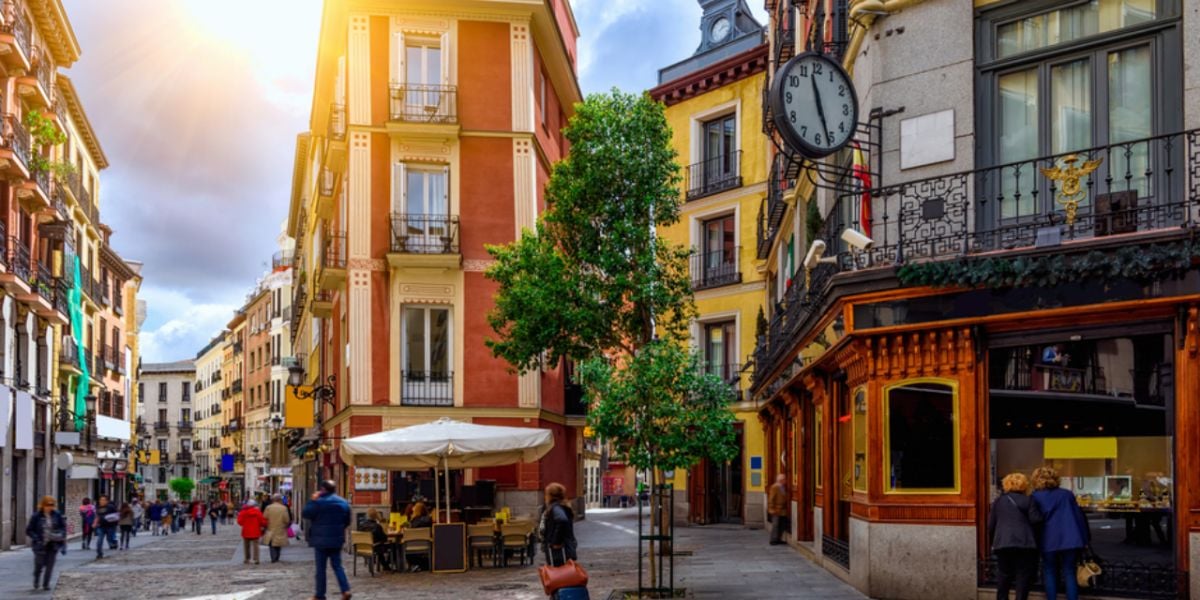
Madrid, the bustling capital of Spain, is a popular destination for thousands of expatriates each year. With its rich cultural heritage, vibrant history and great career prospects, it's no wonder people flock to this dynamic city. If you plan to make Madrid your new home, finding the perfect pad should be at the top of your to-do list even before your arrival. Fortunately, you'll be spoilt for choice, as the city offers a wide range of accommodation options to suit all preferences, requirements and budgets.
Good to know:
Madrid is the most densely populated Spanish city, with around 3.4 million inhabitants. This includes many expatriates from European Union countries and other parts of the world.
Types of accommodation in Madrid
The most common type of rental accommodation in Madrid is a flat, called a piso. Detached, single-family homes exist but are located strictly in the suburbs. Flat sharing is particularly popular among students and singles in Madrid, and rental websites offer a wide selection of both shared and individual apartments. Additionally, you'll find options for both furnished and unfurnished flats during your search.
When considering the type of place you want to call home, be sure to factor in proximity to your work and the neighborhood vibe that suits your lifestyle. Madrid is a sprawling metropolis, and although public transportation is excellent, commute times are long when traveling from one side of the city to the other. Also, areas known for booming nightlife won't appeal to families, just as suburbs may not be what young students seek.
How to find accommodation in Madrid
Here are a few valuable tips to help you find accommodation in Madrid:
- Use online real estate platforms and websites specializing in rentals, such as Idealista and Fotocasa.
- Wander through your favorite neighborhoods and respond to se alquila (for rent) adverts in windows and on balconies. However, this approach may not be best for you if you don't speak Spanish. If you're looking for short-term furnished rentals in Madrid, try Airbnb or Vrbo.
- Use a local real estate agent or relocation services. They can provide guidance and access to a wider range of rental options.
- Join expat communities and social media groups focused on Madrid. These platforms provide a wealth of information, recommendations and personal experiences shared by other expats residing in the capital.
- Be flexible and open to different types of rental accommodation, such as studios or shared flats, as Madrid's rental market can be competitive.
- Don't rush into signing a lease; take the time to carefully read and understand the rental contract, ensuring that all terms and conditions are agreed upon before committing.
Important:
Although real estate agents work for landlords by finding tenants, some bill their services to the renter. This can be as much as one month's rent.
Madrid has an active rental market, so be prepared to spend several weeks searching for the right home for you.
Many expats move to Madrid just before the international school year starts in August and September, making this a hectic time to search for your new home. Therefore, booking short-term accommodation before arriving can help ease the pressure of finding the perfect flat immediately.
Popular neighborhoods for expats in Madrid
Whether you're looking for a lively nightlife scene, a quiet residential area, or convenient access to international schools and amenities, Madrid has something to offer everyone. Among the most popular places for expats to live in Madrid are:
Salamanca: Known for its upscale shops and restaurants, Salamanca is a highly desirable neighborhood. It offers a high-quality lifestyle with luxury apartments and great amenities.
The average price per month for rented accommodation in Salamanca is 26.39 euros per square meter.
Chamberí: This traditional neighborhood is known for its charming streets, beautiful architecture, and colorful local culture. Expats enjoy the relaxed atmosphere and the variety of trendy bars and restaurants.
The average price per month for rented accommodation in Chamberi is 26.51 euros per square meter.
Retiro: Home to Retiro Park, this neighborhood is perfect for those who love outdoor activities. With its peaceful atmosphere and proximity to the city center, Retiro is a popular choice for expats seeking a quiet yet convenient location.
The average price per month for rented accommodation in Retiro is 24.46 euros per square meter.
Malasaña: Famous for its alternative vibe, artistic scene, and lively nightlife, Malasaña is a vibrant neighborhood with a diverse range of trendy bars, boutiques, and international cuisine options.
The average price per month for rented accommodation in Malasaña is more than 22 euros per square meter.
Chamartín: Known for its excellent transportation connections, Chamartín is frequently chosen by expats who work in multinational companies. It offers a mix of residential areas, commercial centers, and green spaces.
The average price per month for rented accommodation in Chamartín is 24.51 euros per square meter.
El Viso: Known for its luxury properties and high-end facilities, El Viso attracts affluent expats seeking a prestigious residential area. Residents enjoy a refined, peaceful environment and easy access to amenities.
The average price per month for rented accommodation in El Viso is 28.19 euros per square meter.
How to find cheap rentals in Madrid
Here are some tips for expats looking for cheap rental accommodation in Madrid:
Use property websites such as Idealista, Fotocasa and Airbnb to find available properties for rent. These platforms usually have filters allowing you to set your budget and preferences to narrow your options.
Consider sharing accommodation with roommates or other expats to reduce costs. Websites like Roomgo and Uniplaces are popular for finding shared apartments or rooms in Madrid.
Join expat groups or forums on social media platforms for insights and recommendations from fellow expats who already live in Madrid. They can share tips on affordable areas and any available housing opportunities.
Check local classifieds, such as newspapers or magazines that offer rental listings. Visiting local real estate agencies in person can also be helpful, as they may have exclusive listings and can provide more personalized assistance.
Look for short-term rental options, especially if you are uncertain about your long-term plans. These may be cheaper and allow you to explore different areas before committing to a long-term lease.
Don´t hesitate to negotiate the rent with the landlord or agent, especially if you plan to stay longer. Sometimes, landlords are open to lowering the rent, especially if the apartment has been vacant for a while.
Be flexible with location. Consider living slightly outside the city center as rents tend to be lower in the outskirts. Additionally, areas well-connected by public transport can offer affordable options and provide easy access to downtown.
Remember to always be cautious when searching for accommodation online and avoid scams by verifying the legitimacy of listings and landlords before making any payments or signing contracts.
Rent prices and other costs in Madrid
Compared to other Spanish cities, rental prices are relatively high in Madrid. As you would expect, they vary according to the neighborhood, type of housing, size and comfort level, among other factors. According to the online database Numbeo, you can expect to pay the following for a flat in Madrid:
- 1-bedroom apartment in the city center: Between €1,030 and €1,800
- 1-bedroom apartment outside the city center: Between €800 and €1,200 per per month
- 3-bedroom apartment in the city center: Between 1,800 and €3,000 per month
- 3-bedroom apartment outside the city center: Between €1,200 and €2,000 per month
In practice, long-term rental contracts of at least a year are the norm, but six-month contracts may also be available. When you sign a rental contract, it's common for landlords to request a security deposit equivalent to one or two months' rent. Usually, the rent includes community charges and taxes but not utilities. Be sure to clarify what you will be paying for before signing your lease. If you're responsible for utilities such as water or electricity, your landlord will present you with the bill each month.
Important:
All rental contracts are in Spanish. Likely, your landlord will want to conduct business in Spanish as well. You'll need a bilingual realtor or a friend to help translate your lease agreement if you don't speak the language.
Useful links:
Airbnb (for short-term furnished rentals)
Vrbo (short-term furnished rentals)
We do our best to provide accurate and up to date information. However, if you have noticed any inaccuracies in this article, please let us know in the comments section below.








